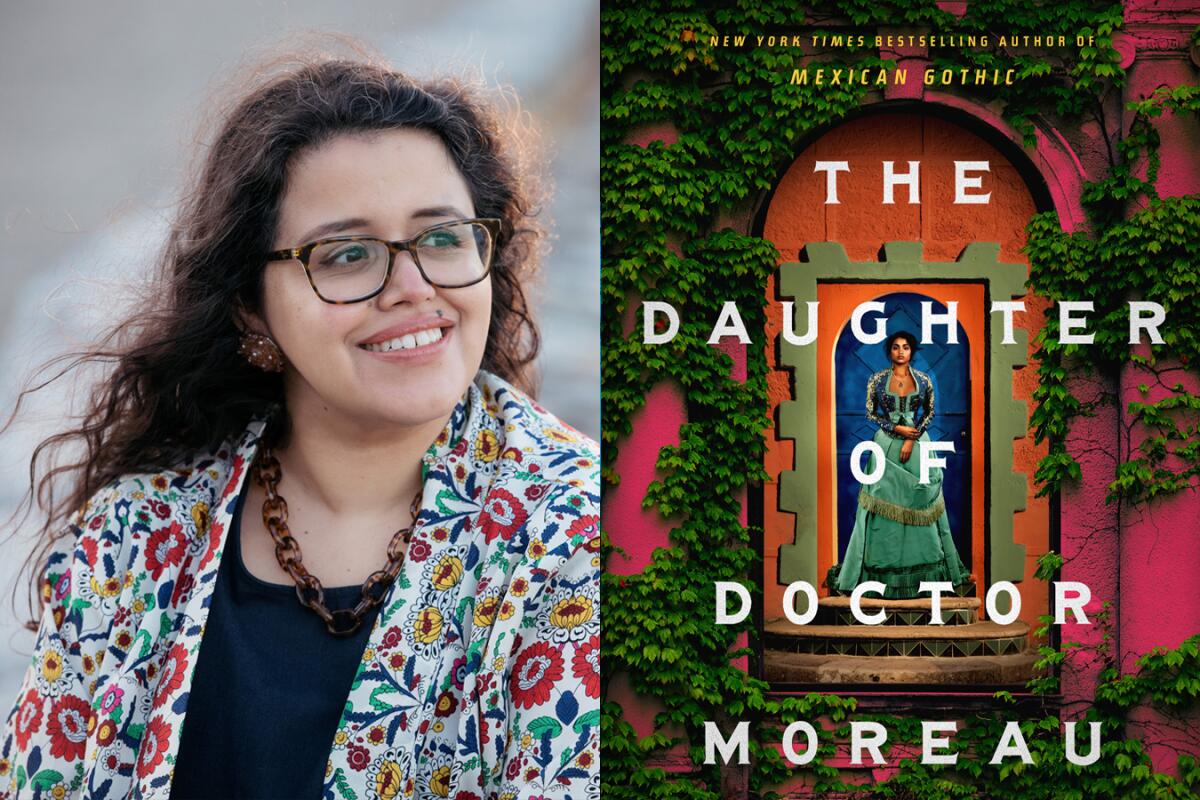Book Club: Breaking the rules all the way to the bestseller list

- Share via
Good morning, and welcome to the L.A. Times Book Club newsletter.
Silvia Moreno-Garcia heard the same advice over and over when she began writing books: Stick to your genre. Stay in your lane. Don’t mess with success.
She thanked everyone for all that safe expert advice, and then ignored it completely — and wrote herself right onto the bestseller list, doing it her way.
Switching from fantasy to mystery to science fiction, to horror and noir, often blending several styles at once, helps Moreno-Garcia find a fresh focus every time out.
“There is also the fact that some of the authors I’ve most admired have exhibited nimbleness and fluidity,” Moreno-Garcia writes in a new essay for The Times. “Walter Tevis wrote the chess drama ‘The Queen’s Gambit,’ but also the science fiction novel ‘The Man Who Fell to Earth’ and ‘The Hustler,’ about a pool player wishing to break into the major leagues. Joyce Carol Oates’ prodigious output, which spans the gamut from family dramas to horror, also caught my imagination.
“Growing up, it delighted me when I found a writer who seemed to escape classification, be it British writer Tanith Lee or Mexican novelist Sergio Galindo.”
Moreno-Garcia blurs the lines more than most and gives booksellers trying to shelve her work headaches. But so did such diverse talents as Joan Didion (celebrated this week for her novels, memoirs, nonfiction and social commentary); Roxane Gay (who writes novels, short stories, nonfiction and comics); and previous book club author Luis J. Rodriguez (the former L.A. poet laureate who also writes nonfiction, novels and children’s books).
“What I’m asking readers is to follow me into the forest,” Moreno-Garcia says in an interview with reviewer Paula L. Woods. “You won’t get lost, hold my hand, and I’ll tell you a story.”
On Sept. 27, Moreno-Garcia joins the L.A. Times Book Club to discuss her latest bestseller, “The Daughter of Doctor Moreau,” a sci-fi thriller inspired by the classic novel by H.G. Wells about a mad scientist and reimagined in the rainforests of the Yucatán Peninsula. Sign up on Eventbrite for this free, livestreaming event, which starts at 6 p.m. PT.
If you’re an audiobook fan: AudioFile Magazine features “The Daughter of Doctor Moreau” on its August list of best listens, via Bookmarks: “Gisela Chìpe’s performance of this audiobook is exceptionally touching. She deftly captures the spirit of these richly defined characters and the mood of mounting dread.”
If you enjoy community discussions like this one: Many readers tell us how much they value the chance to see, hear and meet world-class authors and newsmakers every month. We’re so appreciative of your enthusiastic emails and survey responses. Now take the next step: Please make your tax-deductible donation to the new Los Angeles Times Community Fund to help our community book club keep going and growing.
Banned Books Week
School book bans have seen an unprecedented surge this year, says a new report by PEN America released for Banned Books Week. The report cites three most frequently targeted titles: Maia Kobabe’s memoir, “Gender Queer,” banned in 41 districts; George M. Johnson’s “All Boys Aren’t Blue,” banned in 29 districts; and Ashley Hope Pérez’s “Out of Darkness,” banned in 24 districts. The authors with the most books challenged were Ellen Hopkins, Kobabe and Toni Morrison.
“This censorious movement is turning our public schools into political battlegrounds, driving wedges within communities, forcing teachers and librarians from their jobs, and casting a chill over the spirit of open inquiry and intellectual freedom that underpin a flourishing democracy,” says PEN Chief Executive Suzanne Nossel.
ICYMI: Watch author George M. Johnson, student activist Madison Clevenger, parent Brooke Harper and historian Michael Hines discuss “The Book Ban Wave” during this week’s Ideas Exchange.
What’s next
In October, the L.A. Times Book Club is reading “Dinosaurs,” the soon-to-be-released novel by Lydia Millet.
Millet’s last novel, “A Children’s Bible,” explored climate change and was a 2020 National Book Award finalist.
Now Millet returns with “Dinosaurs,” the story of a 40-something protagonist who escapes Manhattan to seek solitude in the West after a breakup, only to find himself living next door to a family in a glass house. Publishers Weekly calls “Dinosaurs” a “brilliant story of survival.”
The author of more than a dozen novels, Millet lives in the desert outside Tucson, Ariz., where she has worked as an editor and writer at the Center for Biological Diversity. Last year, she wrote this piece for The Times: “Climate crisis is here; so is climate fiction. Don’t you dare call it a genre.”
Keep reading
Fall fiction: Andrew Sean Greer won the Pulitzer Prize in fiction for his 2017 comic novel, “Less.” The San Francisco writer is back this month with a sequel, “Less Is Lost,” which finds a path to both satire and tears. “Take an uncertain man, a ‘middle-aged gay white novelist nobody’s ever heard of,’ and put him in a host of places he’s uncomfortable in, especially when he’s uncomfortable everywhere, and some amount of hilarity is bound to ensue,” says reviewer Mark Athitakis. “Early on we are promised ‘a donkey, a pug, a whale, and a moose.’ In due time the full menagerie arrives.”
Explaining Putin: In the early days of the pandemic, British historian Orlando Figes began his “lockdown” book: a survey of the ideas, myths and beliefs that have molded Russians over the last thousand years. Published as the Russia-Ukraine war enters its seventh month, Figes’ “The Story of Russia” unpacks the region’s history and helps explain current events and motivations.
AI lit: Here’s the latest from arts columnist and book club guest Carolina A. Miranda: “What have I been doing? I’ve been reading books — looking for the weirdest descriptions I could find of Los Angeles, and feeding them into an AI image generator.” Read more.
Giving it away: “We have always considered Patagonia an experiment in doing business in unconventional ways,” Yvon Chouinard wrote in his book “Let My People Go Surfing.” “None of us were certain it was going to be successful, but we did know that we were not interested in ‘doing business as usual.’” On Sept. 14, the billionaire CEO announced that he is giving away his Ventura-based outdoor apparel company to fight climate change.
Defender of nature: A new book, “Citizen Justice,” examines the environmental legacy of U.S. Supreme Court Justice William O. Douglas. “He was advocating for the environment, and he turned out to be so critical to the history of conservation,” says M. Margaret McKeown, a San Diego judge and the book’s author.
Bilingual book festival: The fourth annual Los Angeles Libros Festival continues on Saturday, Sept. 24, featuring Spanish-language and bilingual storytelling, author talks, workshops and performances at the Central Library downtown. It’s free.
Booked up: Have you checked out the new L.A. Times Book Club hats, socks and crewnecks? Send us a photo of what you’re wearing and reading in an email to [email protected].
Last word: “Read the books they’re banning,” says actor and former “Reading Rainbow” host LeVar Burton. “That’s where the good stuff is.”
Sign up for our Book Club newsletter
Get the latest news, events and more from the Los Angeles Times Book Club, and help us get L.A. reading and talking.
You may occasionally receive promotional content from the Los Angeles Times.




